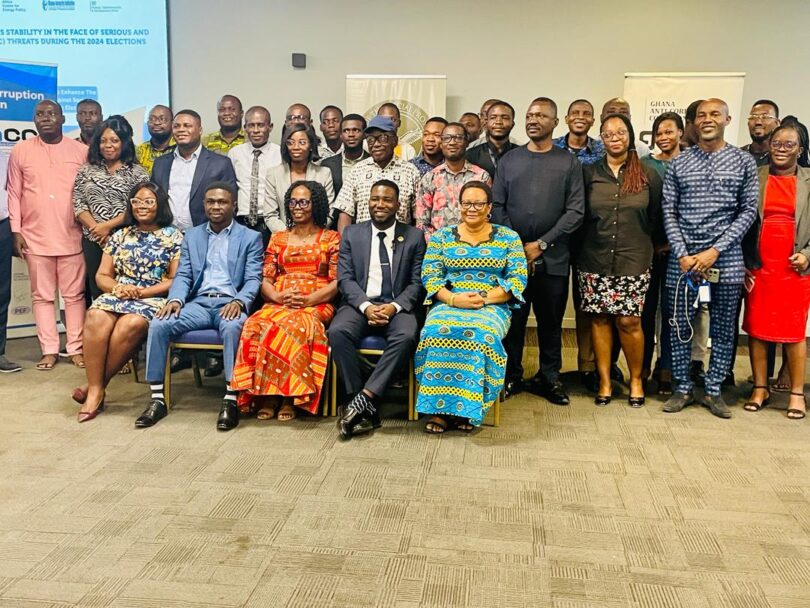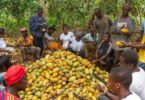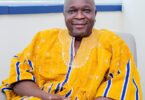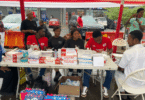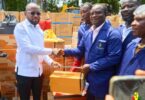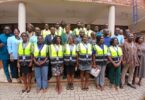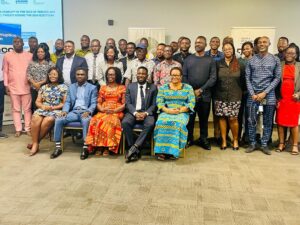
Group picture of journalists at the Workshop
Report by: Ishmael Barfi
As the country Ghana prepares for her Presidential and Parliamentary elections, the fourth arm of government the Media has been urged to intensify reportages on the fight against Serious and Organized Crimes (SOC) and the threats they pose to Ghana in their coverage of news ahead of elections 2024.
According to the Executive Secretary of the Ghana Anti-Corruption Coalition, (GACC), Madam Beauty Emefa Narteh, the media has a critical role in sanitizing the system as politicians are gearing up for intensive campaigns ahead of the general elections.
To her, there is a need to armor journalists to expose politicians who engage in illegal activities and use the proceeds to fund electoral processes or political elements.
“We should be able to expose them and also name and shame in any possible way and also prosecute them”, she reiterated.
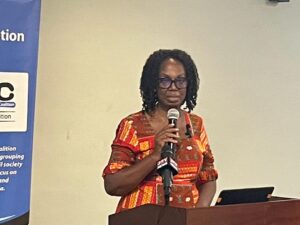
Ghana Anti-Corruption Coalition Executive Secretary, Madam Beauty Emefa Narteh
The call was made at a Workshop organized by the Ghana Anti-Corruption Coalition (GACC) in consortium with the Ghana Integrity Initiative (GII), and Africa Centre for Energy Policy (ACEP) with funding support from the Foreign, Commonwealth & Development Office (FCDO) in Accra on Wednesday, February 5, 2024.
The one-day workshop under the theme “Safeguarding Ghana’s Stability in the Face of Serious and Organised Crime (SOC) Threats During the 2024 Elections” aimed to enhance the media’s capacity to contribute to the fight against Serious and Organized Crime (SOC).
This Ghana Anti-Corruption Coalition (GACC) believes would equip journalists to sensitize the general public in their reportages and also be able to identify crucial places in their investigation.
The Executive Secretary of the GACC, Madam Beauty Emefa Narteh believed that this can safeguard Ghana’s stability since SOC poses a series of serious threats to the country’s elections.
Financing campaigns and elections-related corruption, Madam Beauty Narteh emphasized are part of SOC revealing that, data from CDD speaks of the canker.
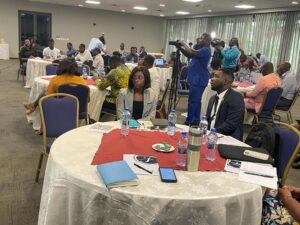
Cross Section of participants at the workshop
“Until we can expose the canker, Ghana will lose and so we need to work together”, adding that, “We aim to fortify the government architecture in fighting against illicit funds” hence the media capacity building workshop”.
The Executive Director therefore appealed to the media to prioritize SOC issues in their editorials in the lead-up to the 2024 elections.
Meanwhile, a Deputy Head of Prosecution at the Economic and Organised Crime Office (EOCO), Leo Anthony Asiamah revealed that the effects of SOC increase public sector corruption and undermine the integrity of the country’s elections.
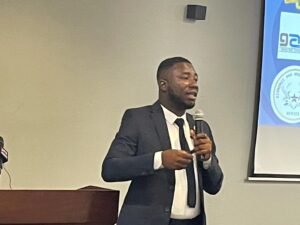
A Deputy Head of Prosecution at the Economic and Organised Crime Office (EOCO), Leo Anthony Asiamah
In combating this canker, he called for a mmulti-faceted approach maintaining that EOCO is doing its part to curb the menace in the system.
Taking his turn at the workshop, the Director of Research and Communications at the Office of the Special Prosecutor(OSP), Sammy Darko advised the media to always be circumspect and point out the particular crime reporting on than classifying all crimes under corruption.
Fraud, vote buying, elections financing he indicated are forms of corruption-related crimes that, journalists must indicate specific crimes in their reportages, which he said would aid law enforcement agencies like the OSP to confront it head on.
The Office of the Special Prosecutor he revealed has investigated a lot of public officials over unexplained wealth and other elections-related corruption but oftentimes times their impediments have been the courts.
“ You hear people say the OSP should have investigated before going to court but the law states that freeze first and investigate”, the one time journalist noted.
On his part, Mr. Kweku Krobea Asante, a representative of the Media Foundation of West Africa (WFWA) stressed the need for the media to dig deep into sources of campaign funding and Party financing especially as the political parties are gearing up for this year Presidential and Parliamentary elections.
“When this is done, elections-related corruption which is a threats to our elections can be curtailed”, he admonished.
Source: www.thenewindependentonline.com


